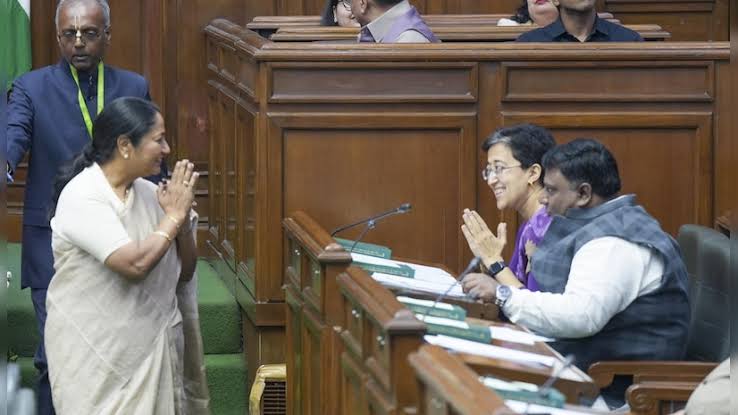The BJP government, led by Delhi Chief Minister’s Rekha Gupta, presented the CAG report on the Delhi Excise Policy on Tuesday. The report said that the capital has lost more than Rs 2000 crore due to the new liquor policy.
‘Regulation of liquor in Delhi and execution audit on supply’ covers a period of four years from 2017-18 to 2020-21. The report examines the regulation and supply of foreign liquor (IMFL) and foreign liquor in India in Delhi.
This report is one of the 14 CAG reports pending on the performance of the previous Aam Aadmi Party government. According to the report introduced today, the audit found that the Excise Department has made several discrepancies in monitoring and regulation of liquor supply in the National Capital Region Delhi.
According to the report, the state government has suffered a cumulative loss of more than Rs 2,000 crore due to the excise policy of 2021-22.
Many questions arise on the functioning of the Excise Department as to how the department is fulfilling its responsibility. According to the report observation, the total financial implication of audit findings is around Rs 2,026.91 crore.
The audit found that the department could not effectively implement Rule 35 of the Delhi Excise Rules, 2010. This rule prevents the relevant parties from issuing various licenses (wholesale sellers, retailers, HCRs, etc.) under execution audit on liquor supply and regulation in Delhi.
Due to its decrease in compliance, the existence of general directors continued to exist among various types of licensed institutions.
Irregularities in issuing license
The audit found that the department was issuing license without following the terms and conditions prescribed for issuing excise rules and various types of licenses. It was found that:
• Licenses were issued without ensuring solvency.
• Licensed without presenting the audited financial statements.
• Licenses were issued without presenting data of sales and wholesale price declared in other states and all year.
• Licenses were issued without verification of criminal background from competent authority.
Manipulation in pricing
The audit found that the Excise Department gave a discretion to declare the L1 licensee (manufacturer and wholesaler) as an ex-dysm. pric (EDP) for liquor priced higher than a certain level. Subsequently, all price components were added after construction, including the benefit of the manufacturer. Audit found that:
• Different states had different EDPs for liquor supplied by the same manufacturer unit.
• This discretion allowed L1 licenses to manipulate EDP for their own benefit.
• Pricing and sales analysis of some brands showed that sales declined due to discretionary EDP, causing damage to excise revenue.
Since the cost details were not sought to check the appropriateness of the EDP, the L1 license holder was at risk of benefiting from hidden profits in the increased EDP. The concept of EDP needs to be defined transparently and cost sheets should be obtained in support of declared EDP.
Quality control deficiencies
The audit found that quality control was insufficient. It is the responsibility of the Excise Department to ensure that the liquor supplied in Delhi is in accordance with the prescribed quality standards. The current regulatory structure has relevant provisions, which make it mandatory to submit various test reports to wholesale licensees (L1) as per provisions of the Bureau of Indian Standards (BIS). However, the Excise Commissioner did not determine separate quality specifications.
Many cases were found in audit, where:
• The test reports were not in line with the BIS specifications.
• The Excise Department issued licenses despite large shortcomings.
• Important test reports of water quality, harmful materials, heavy metals, methyl alcohol, microbiological test reports etc. were not presented for various brands.
• In 51% of the cases of foreign liquor -related sample tests, the test reports were more than a year old, not provided, or the date was not mentioned in them.
Flaws in enforcement and surveillance
The audit found serious deficiencies in the enforcement process of the Excise Department. The role of the department was mainly limited to seizure and disposal of case property. Excise Intelligence Bureau (EIB) failed to act as an effective preventive.
The data created by the department was fragmented and underdeveloped, which had very little or no analytical value. The actual raids were discretionary and were unorganized in the absence of any standard operation process (SOP). Evidence collection and lack of hardness in evidence, including the use of EscIMS data, weakened cases. There were mistakes in inspection reports and show cause notices were insufficient.
Flaws in the creation of excise policy
While preparing the new excise policy, the recommendations of the expert committee were ignored. Documentary evidence of this was not available.
Some significant changes, which were not properly justified:
• Private unit was granted wholesale sales license in place of the state -owned wholesale unit.
• Ins advance recovery of excise duty in license fee instead of excise duty per bottle.
• One person was allowed to receive 54 shops instead of allotting maximum two shops.
In addition, the Cabinet or Lt. Governor’s opinion was not consulted before giving significant revenue related exemption/concession, violating the cabinet decision.
Revenue loss
The audit found that the new policy obstructed the supply due to limited number of retail license holders. The government incurred a revenue loss of about Rs 890 crore, as the surrendered retail licenses were not re -tendered. The rebate given to the zonal licensees caused revenue loss of about Rs 941 crore.
On the basis of covid sanctions, zonal licensees were given a license fee of Rs 144 crore. There was a loss of about Rs 27 crore due to wrong recovery of security deposits.
Overall, the government suffered a revenue loss of about Rs 2,002 crore due to shortcomings in the implementation of the new Excise Policy. The CAG report has highlighted serious irregularities in Delhi’s excise policy. The report underlines the deficiencies of policy making, issuing licenses, pricing, quality control, enforcement and monitoring. Due to this, the government has suffered heavy financial losses and questions have been raised on the effectiveness of the regulatory system.










